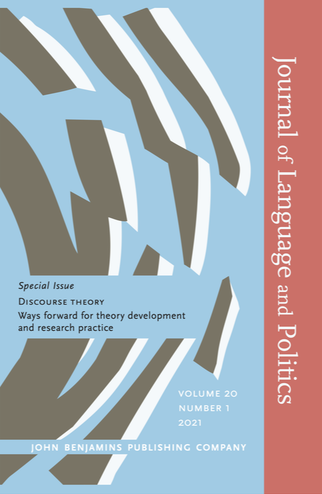Discourse theory:
|
This special issue of the Journal of Language and Politics considers the past, present and future of discourse theory as a conceptual framework and interdisciplinary research practice that is deployed across a wide range of fields, including political studies, discourse studies, media and communication studies, critical management studies, and policy studies.
The focus of the special issue is on work inspired by the poststructuralist and post-Marxist discourse theory originally developed by Ernesto Laclau and Chantal Mouffe (1985), but one central aim of the special issue is to highlight the interdisciplinarity of discourse theory and the dialogue betweend discourse theory and other traditions.
There are eleven articles in this special issue. Following the English translation of a text by Ernesto Laclau hitherto only published in French - Politics as the Construction of the Unthinkable - the ten subsequent polemic-programmatic articles reflect on ways forward for discourse theory.
The aim being to further discourse theory, the editors' invitation to the authors, originating from different disciplines, was to critically and constructively engage with discourse theory, reflect on its strengths but also its limitations, and to propose paths for future theoretical development as well as for rigorous and innovative research practice.
The focus of the special issue is on work inspired by the poststructuralist and post-Marxist discourse theory originally developed by Ernesto Laclau and Chantal Mouffe (1985), but one central aim of the special issue is to highlight the interdisciplinarity of discourse theory and the dialogue betweend discourse theory and other traditions.
There are eleven articles in this special issue. Following the English translation of a text by Ernesto Laclau hitherto only published in French - Politics as the Construction of the Unthinkable - the ten subsequent polemic-programmatic articles reflect on ways forward for discourse theory.
The aim being to further discourse theory, the editors' invitation to the authors, originating from different disciplines, was to critically and constructively engage with discourse theory, reflect on its strengths but also its limitations, and to propose paths for future theoretical development as well as for rigorous and innovative research practice.

